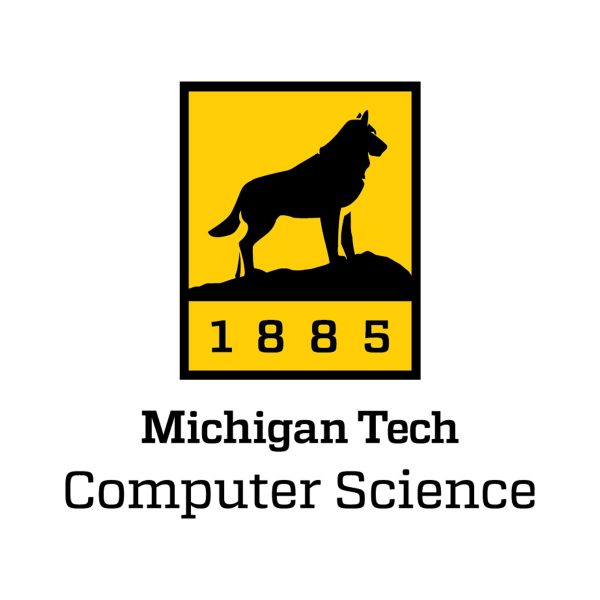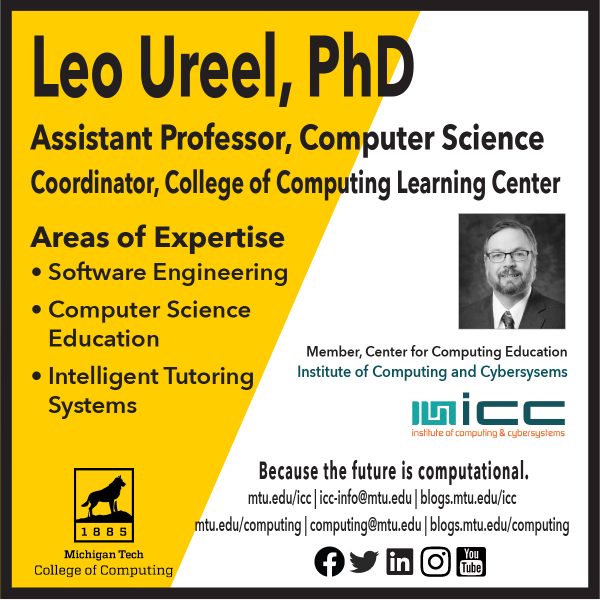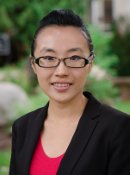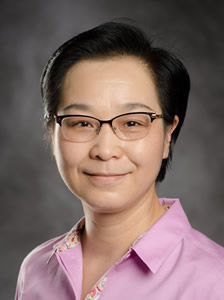
Department of Computer Science faculty and students presented two posters, a paper, and chaired a session at the 26th Annual Conference on Innovation and Technology in Computer Science Education (ITiCSE), conducted online June 26 to July 1, 2021.
“A Visualization for Teaching Integer Coercion,” a poster presented by James Walker with Steven Carr, Ahmed Radwan, Yu-Hsiang Hu, Yu Chin Cheng, Jean Mayo, and Ching-Kuang Shene, was one of three posters that received the conference’s Best Poster Award.
The poster describes the Expression Evaluation (EE) visualization tool. The tool is designed to aid students in understanding type conversions that take place implicitly in C. Understanding type conversions is essential to avoid Integer errors in C which continue to be a source of security vulnerabilities.
An additional paper and poster were presented at the conference, below. Dr. Linda Ott chaired a conference session on Students: Diversity.
Poster: Modeling the Growth and Spread of Infectious Diseases to Teach Computational Thinking by Meara Pellar-Kosbar, Dylan Gaines, Lauren Monroe, Alec Rospierski, Alexander Martin, Ben Vigna, Devin Stewart, Jared Perttunen, Calvin Voss, Robert Pastel and Leo Ureel II
The poster discusses a simulation model developed to teach middle school students about the spread of infectious diseases augmented with affordances to help students develop computational thinking skills. The simulation was partially developed as a Citizen Science project in the courses CS4760 and CS5760, User Interface Design and Human Computer Interaction.
Presentation: Frozen in the Past: When it Comes to Analogy Fears, It’s Time For Us to “Let it Go” by Briana Bettin and Linda Ott
This position paper describes a fundamental difference in attitudes toward the use of analogy in the computer science education community versus other STEM education communities. Additionally, it provides suggestions for how to address concerns in the CS education research community in order to advance research into the use of analogy in computing education
The 26th annual conference on Innovation and Technology in Computer Science Education (ITiCSE) was sponsored by ACM, the ACM Special Interest Group on Computing Education (SIGCSE), the ACM Europe Council, and Informatics Europe.

The 2020-2021 CTL Instructional Award for Innovative or Out of Class Teaching is being presented to two instructors, and Assistant Professor Leo Ureel, Computer Science, and Libby Meyer, senior lecturer, Visual and Performing Arts.
Ureel was nominated in recognition of his “student-centric efforts which have increased retention and diversified the cohort of first-year computing students.”
Ureel’s presentation, “Three course innovations to support communication,” will be presented at 3:30 p.m. on Thursday, February 18, 2021, as part of the CTL Instructional Award Presentation Series.
Link here to register for the event.
Ureel is a member of the Institute of Computing and Cybersystems’s (ICC) Computing Education Center.
Meyer’s presentation, “Beyond Carrots and Sticks: Mastery Based Grading and Narrative Assessment” will also be presented on February 18.
During spring 2017, academic deans were asked to begin recognizing instructors making contributions in these areas as part of the Deans’ Teaching Showcase, effectively nominating them for instructional awards.
CTL and Provost’s office members along with previous awardees then select one individual in each category from a pool composed of the Showcase and those nominated to the Academy of Teaching Excellence.
Ureel Lecture Abstract
Three course innovations to support communication Introductory courses present many communication challenges between faculty and first year students. In this context, we discuss three innovations used in our introductory computer science courses.
The first is the use of Snap, a high-level, visual programming language, as a form of pseudocode during the first five weeks of the course to build student vocabulary and problem solving skills before tackling programming in Java.
The second is a Code Critiquer developed as a Canvas plugin to provide immediate guidance and feedback to students when they submit their programming assignments.
The third is a grade visualization tool that helps students understand their current performance in the course and project a range that will contain their final grade. While not everyone teaches introductory computer science, we discuss how these or similar innovations and tools might apply to your course.

by Office of the Provost & Senior VP for Academic Affairs

Ye “Sarah” Sun (ME-EM) has accepted the Lou and Herbert Wacker Professorship in Mechanical Engineering, which was created to retain and attract high-quality faculty who are at the top of their profession, can excite students to think beyond the classroom material, and knows how to integrate their research into the classroom.
Sun was chosen for this position as she is recognized as a rising star and outstanding researcher in the area of wearable sensors, systems, and robotics and a respected member of the smart health community.
In recognition of her innovative research in wearable sensors, Sun’s NSF CAREER award was selected for presentation to congressional offices in April 2019.
Sun is the director of the Institute of Computing and Cybersystems’s Center for Cyber-Physical Systems.
Among her research honors is the prestigious National Science Foundation (NSF) CAREER Research Award on “System-on-Cloth: A Cloud Manufacturing Framework for Embroidered Wearable Electronics.”
Sun will use this recognition and support to enhance her research in wearable and soft robotics. Her goal is to develop flexible textile robotics by leveraging the physical understanding and modeling of textile materials and dynamics and the recent advances of morphological computing.
Textile robotics are not only able to enhance human capabilities via wearable design but also achieve autonomous locomotion. The controllable structures of textiles directly provide a unified platform that is capable of integrating sensing and actuating into textile robotics itself. The positioning support will be used to recruit graduate students and to set up the manufacturing platform.
by Vice President for Research Office
The Vice President for Research Office announces the Fall 2020 REF awards. Thanks to the individual REF reviewers and the REF review panelists, as well as the deans and department chairs, for their time spent on this important internal research award process.
Research Seed Grants:
- Sajjad Bigham, Mechanical Engineering-Engineering Mechanics
- Bo Chen, Computer Science
- Daniel Dowden, Civil and Environmental Engineering
- Ana Dyreson, Mechanical Engineering-Engineering Mechanics
- Hassan Masoud, Mechanical Engineering-Engineering Mechanics
- Xinyu Ye, Civil and Environmental Engineering
by Michael R. Meyer, Director, William G. Jackson CTL

Assistant Professor Leo Ureel, Computer Science, is among the Deans’ Teaching Showcase members who have been selected to receive 2020 CTL instructional Awards.
The awardees will make presentations next spring semester to share the work that led to their nomination.
When their presentation concludes, each will be formally recognized with a certificate and $750 in additional compensation .
Tuesday, Jan. 26, 2021 — Curriculum Development: Katrina Black, Senior Lecturer in Physics
Thursday Feb. 18, 2021 — Innovative or Out of Class Teaching: Libby Meyer, Lecturer in Visual and Performing Arts and Leo Ureel, Assistant Professor in Computer Science
Tuesday, March 30, 2021 — Large Class Teaching: Kette Thomas, Associate Professor of Diverse Literature in Humanities
These events will take place from 3:30-4:30 on the dates listed. Detailed titles, topics, and registration links for each presentation will be circulated in anticipation of each event.
Many thanks to the previous CTL instructional award recipients and the Provost’s office staff who were instrumental in the selection process.
Please consider suggesting instructors whom you’ve seen make exceptional contributions in Curriculum Development, Assessment, Innovative or Out-of-Class teaching or Large Class Teaching to the appropriate chair or dean so that they can be considered for the upcoming (2021) Deans’ Teaching Showcase during spring semester.

Bo Chen, the Michigan Tech Dave House Professor of Mechanical Engineering and Electrical Engineering, has received the designation of Fellow from the American Society of Mechanical Engineers (ASME).
The Fellow level of membership is conferred to worthy candidates by the ASME Committee of Past Presidents to recognize their outstanding engineering achievements.
Nominated by ASME Members and Fellows, an ASME Member nominee must have 10 or more years of active practice, and at least 10 years of active corporate membership in ASME.
Chen is the director of Michigan Tech’s Intelligent Mechatronics and Embedded Systems (IMES) Laboratory. She has a dual faculty appointment in the Department of Electrical and Computer Engineering. Visit Chen’s faculty webpage here.
A member of the Institute of Computing and Cybersystems (ICC)’s Center for Cyber-Physical Systems (CPS), Bo Chen conducts interdisciplinary research in the areas of mechatronics and embedded systems, agent technology, connected and autonomous vehicles, electric vehicle-smart grid integration, cyber-physical systems and automation.
William Predebon, chair of the the Department of Mechanical Engineering-Engineering Mechanics said, “Dr. Chen has made major contributions in her field of embedded systems with application to hybrid-electric and electric autonomous systems. Her course in Model-based Embedded Control System Design is regularly in high demand by not only ME students but also EE students. This is a testament to the importance of the topic and her teaching ability.”
ASME helps the global engineering community develop solutions to real world challenges. Founded in 1880 as the American Society of Mechanical Engineers, ASME is a not-for-profit professional organization that enables collaboration, knowledge sharing and skill development across all engineering disciplines, while promoting the vital role of the engineer in society. ASME codes and standards, publications, conferences, continuing education and professional development programs provide a foundation for advancing technical knowledge and a safer world.
 The Office of the Provost and Senior Vice President for Academic Affairs has announced that Dr. Timothy Schulz (DataS), professor of Electrical and Computer Engineering, has been named a 2019 University Professor.
The Office of the Provost and Senior Vice President for Academic Affairs has announced that Dr. Timothy Schulz (DataS), professor of Electrical and Computer Engineering, has been named a 2019 University Professor.
The University Professor title recognizes faculty members who have made outstanding scholarly contributions to the University and their discipline over a substantial period of time. University Professors will not exceed 2% of the total number of tenured and tenure-track faculty at Michigan Tech. This year, two professors were awarded the title of University Professor. The second recipient is Dr. Kathleen Halvorsen, professor of Natural Resource Policy in the Department of Social Sciences.
The confidential process for selecting recipients spans the academic year and recipients for each award are notified in mid-May. Additional details regarding the award and selection procedures can be found on the provost’s website: mtu.edu/provost/faculty/awards.